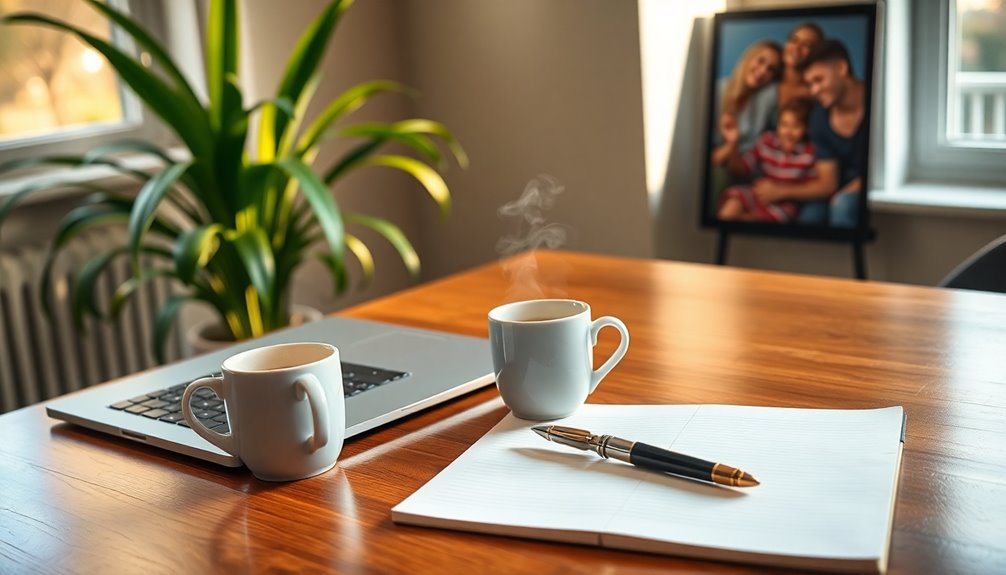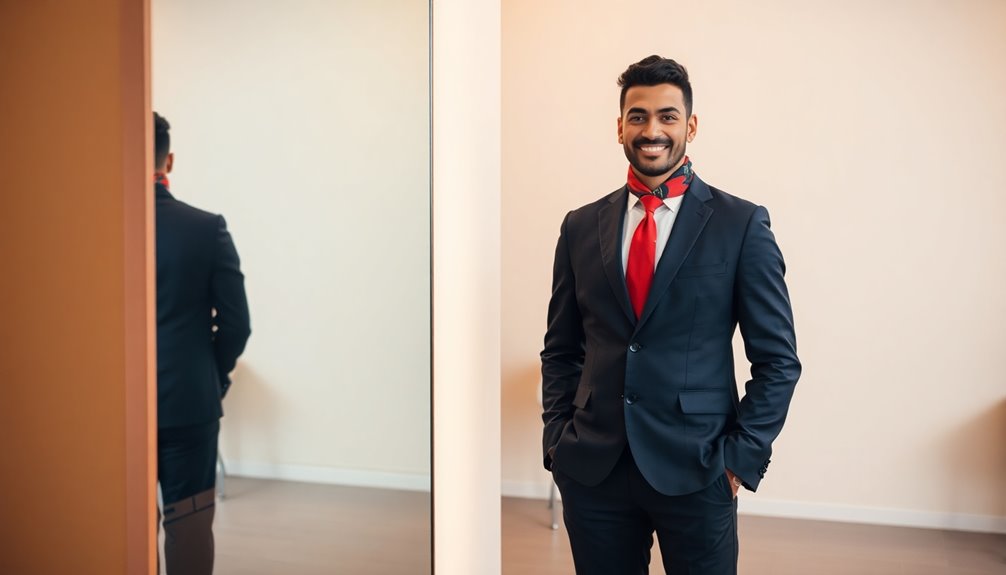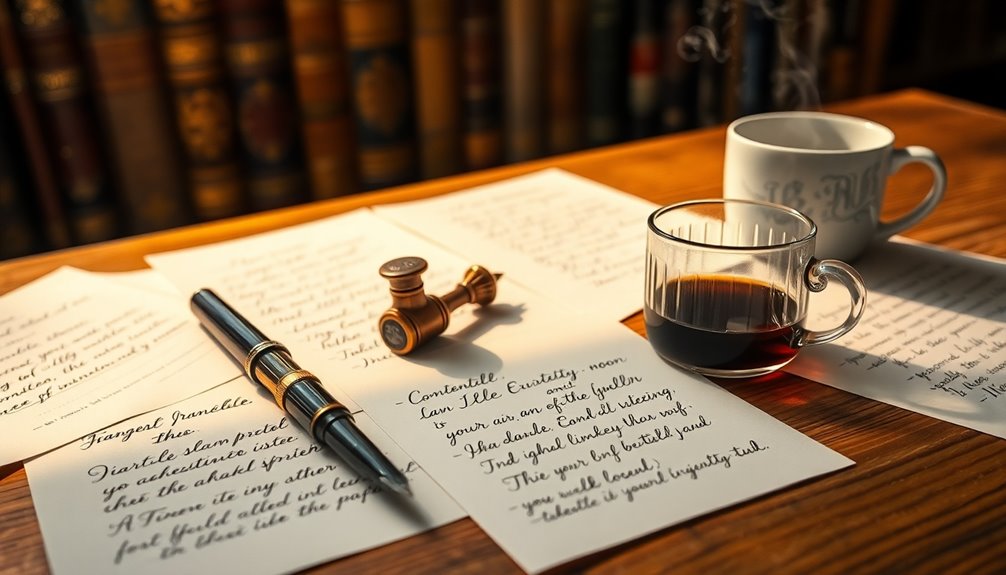To craft the perfect thank-you email, start with a clear subject line and a personalized greeting. Express your gratitude for the opportunity and mention the specific position discussed. Highlight your qualifications relevant to the role and reference key topics from the interview to show attentiveness. Keep the tone professional and concise, aiming for a few short paragraphs. It's vital to send this email within 24 hours to reinforce your enthusiasm. Avoid generic messages and errors to maintain a strong impression. Stick around to uncover additional tips that can elevate your thank-you email even further.
Key Takeaways
- Use a clear subject line like "Thank You for Your Time" to set a professional tone.
- Personalize the greeting with the interviewer's name to create a genuine connection.
- Express immediate gratitude for the opportunity and mention the specific position discussed.
- Highlight relevant qualifications and reference specific topics from the interview to show engagement.
- Send the email within 24 hours to demonstrate enthusiasm and professionalism.
Types of Thank-You Emails
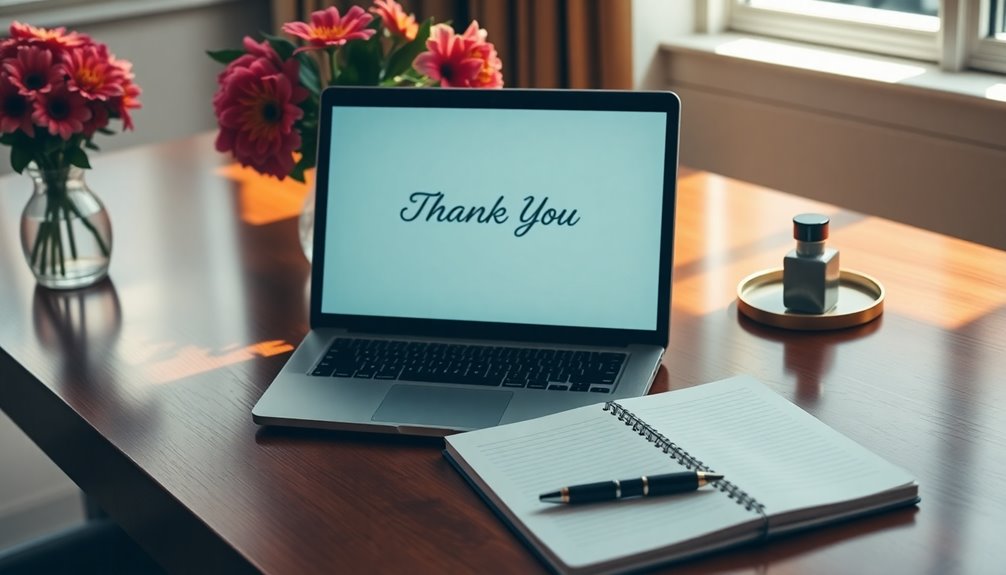
When crafting your thank-you email, understanding the types of notes you can send is essential. You'll want to choose between an informal note or a formal letter based on the interview context. Informal notes work well in casual industries or when you know the interviewer well.
On the other hand, a formal letter is necessary for official settings, as it maintains professionalism.
Don't forget about the subject line; using concise phrases like "Thank you for your time" can set the right tone immediately. Personalization is key, so start with a salutation using the interviewer's name.
Finally, make sure to express your gratitude, mentioning the specific position discussed to reinforce your interest.
Essential Components to Include
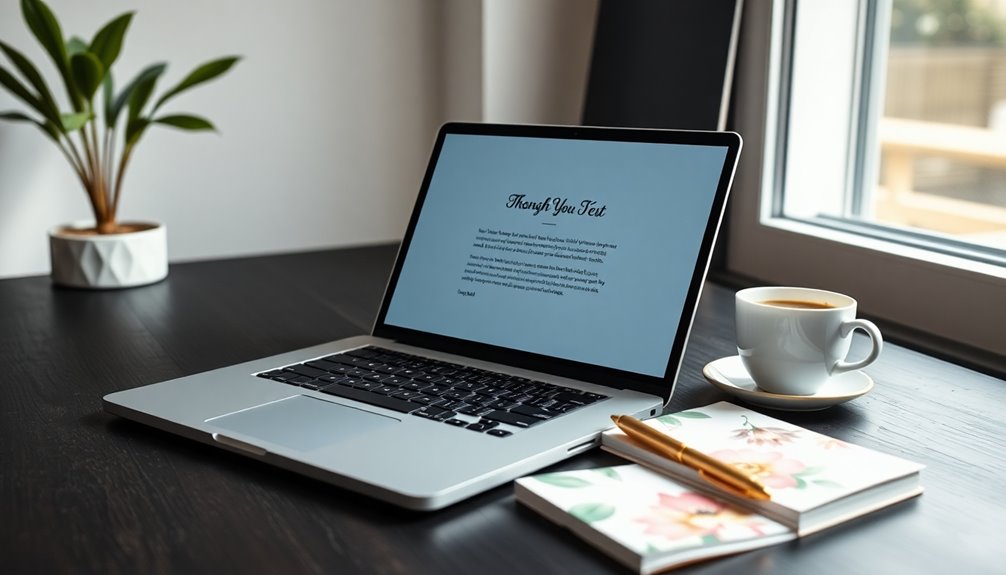
Including essential components in your thank-you email is crucial for making a lasting impression. Start with a clear subject line, like "Thank You for Your Time." Personalize your greeting by using the interviewer's name to show authenticity.
Express your gratitude right away, thanking them for the interview and mentioning the specific position you discussed.
Next, briefly recap your qualifications, highlighting relevant skills that align with the role. This reinforces your fit for the position. It's also beneficial to reference specific topics from the interview, which shows attentiveness. Additionally, consider how your ability to navigate financial planning can be an asset in a team-oriented environment.
Finally, encourage follow-up by suggesting next steps or expressing your willingness for further discussions. Keeping it concise while incorporating these elements will strengthen your message.
Why Thank-You Emails Matter
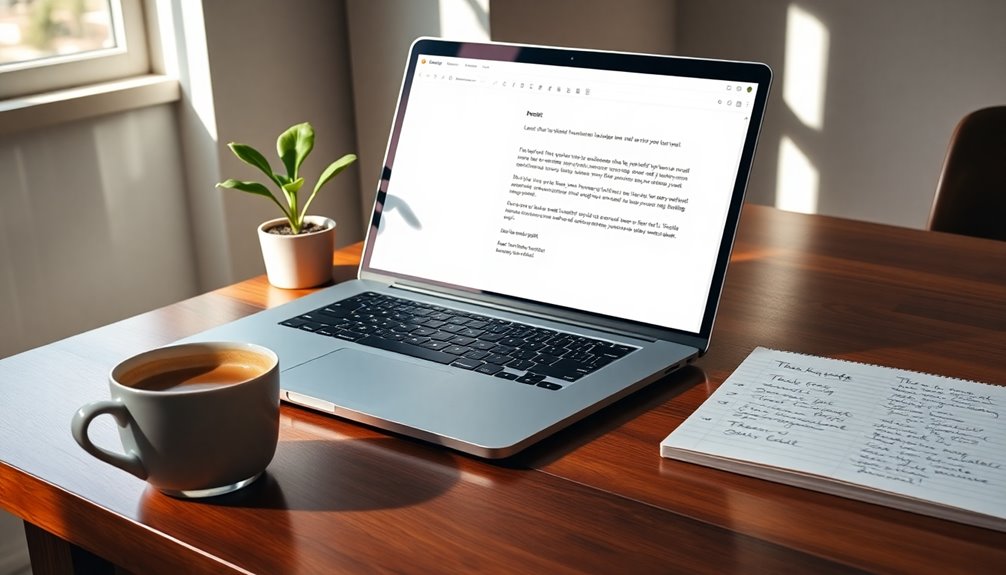
Thank-you emails play a crucial role in the job application process, acting as a bridge between you and the interviewer. They reinforce your interest in the position, showing that you're genuinely enthusiastic about the opportunity.
By sending a thank-you email, you demonstrate professionalism and courtesy, which can set you apart from other candidates. This small gesture also gives you another chance to influence hiring decisions, allowing you to reiterate your qualifications and unique contributions.
Additionally, referencing specific conversations from the interview can help jog the interviewer's memory and strengthen your connection. In a competitive job market, thank-you emails are an essential tool that can positively impact the outcome of your application.
Moreover, adopting a growth mindset can further enhance your ability to navigate the job application process and turn challenges into opportunities.
Don't underestimate their importance!
Best Practices for Sending
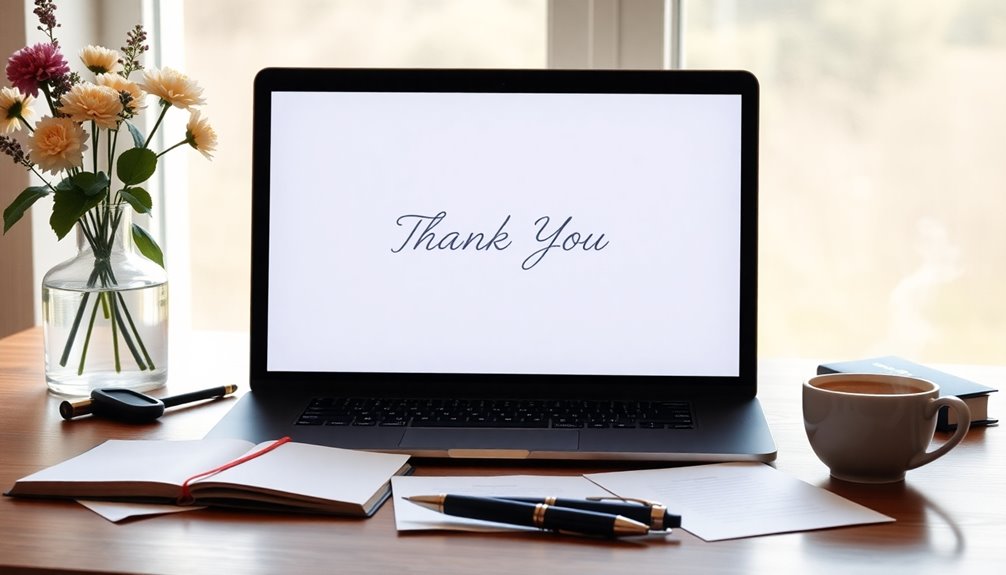
To make the most of your thank-you email, timeliness is key. Aim to send your email within 24 hours of the interview. This shows your enthusiasm and appreciation while keeping your candidacy fresh in the interviewer's mind.
Keep it concise; a few short paragraphs will suffice. Start with a personalized greeting, and express your gratitude for the opportunity. Mention specific points from the conversation to reinforce your interest and qualifications.
Don't forget to include your contact information, making it easy for them to reach out. Finally, consider whether a handwritten note might add a personal touch, but remember that emails are quicker and often more practical in a fast-paced hiring environment. Additionally, user consent is essential for ensuring that your communication respects privacy and builds trust.
Common Mistakes to Avoid
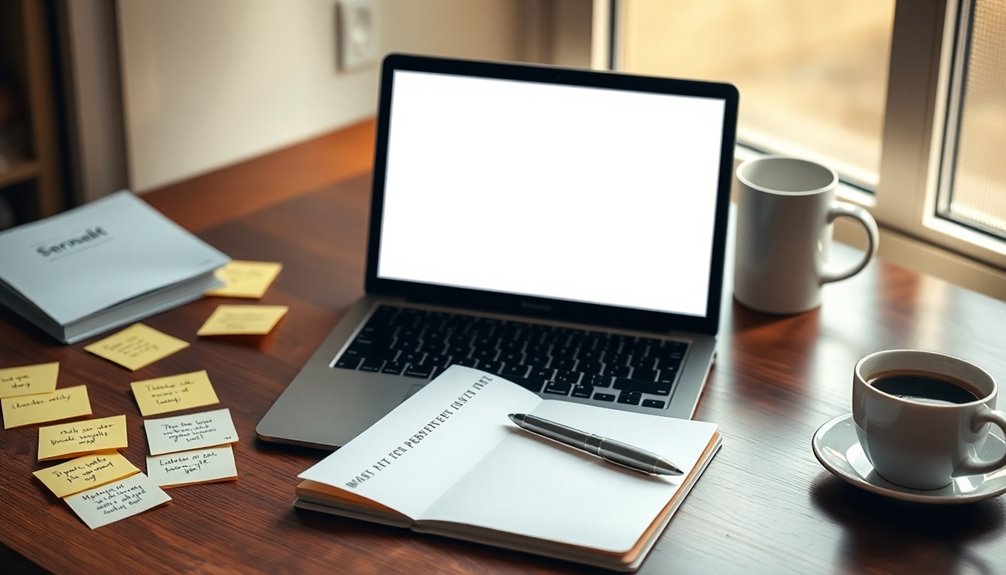
Crafting a thank-you email can be tricky, and avoiding common pitfalls is essential for making a lasting impression.
First, steer clear of generic messages; personalize your email to reflect your conversation.
Don't forget to proofread—spelling and grammar errors can undermine your professionalism.
Also, avoid being too casual; maintain a respectful tone appropriate for the setting.
Don't ramble; keep your email concise and focused on gratitude and key points from the interview.
Finally, skip the lengthy delays—send your thank-you email within 24 hours to show your enthusiasm. Additionally, consider establishing a support system for ongoing networking and relationship building after your initial communication.
Frequently Asked Questions
How Long Should a Thank-You Email Be?
A thank-you email should typically be concise, ideally around 50 to 150 words.
You want to express your gratitude without overwhelming the recipient. Focus on key points: thank them for their time, reiterate your interest in the position, and briefly highlight your relevant qualifications.
Keeping it short shows respect for their time while still delivering your message effectively.
Can I Send a Thank-You Note via Social Media?
Sending a thank-you note via social media can be like planting seeds in a garden; it nurtures connections and keeps your name fresh in an interviewer's mind.
If you know the person well or the industry leans casual, it's a fine choice. Just remember to keep it professional and concise.
For formal settings, though, stick with traditional methods. Being genuine is key, no matter the platform you choose!
Is It Necessary to Send a Thank-You Note After Every Interview?
Yes, it's necessary to send a thank-you note after every interview.
Doing so reinforces your interest in the role and shows appreciation for the interviewer’s time. It also highlights your professionalism and good manners, which can leave a lasting impression. Following up with a thank-you note can also provide an opportunity to reiterate how your skills and experience make you a great fit for the position. In addition, it gives you a chance to express your excitement about the prospect of working with the team and contributing to the company’s success. As a work methods and procedures manager, I am confident that my attention to detail and dedication to efficiency would make a positive impact on the organization.
A well-crafted note gives you another chance to reiterate your qualifications and fit for the position.
Don't underestimate the positive impact a simple thank-you can have on the hiring decision!
What if I Forgot to Send a Thank-You Email on Time?
If you forgot to send a thank-you email on time, don't stress too much.
Acknowledge your oversight and send it as soon as you can. Apologize briefly for the delay, express your gratitude for the opportunity, and reiterate your interest in the position.
It's better late than never, and this shows your professionalism. Just keep it concise and sincere, and you might still leave a positive impression.
Should I Include a Personal Anecdote in My Thank-You Email?
You might consider including a personal anecdote in your thank-you email if it strengthens your connection with the interviewer.
It can make your message more memorable and showcase your personality. Just guarantee it's relevant and concise, highlighting how your experience aligns with the role.
Avoid lengthy stories; a brief mention can be impactful.
Ultimately, it's about reinforcing your appreciation while reminding them of your suitability for the position.
Conclusion
In the end, sending a thank-you email is like planting seeds in a garden; with care and attention, you cultivate a lasting impression. By personalizing your message and expressing genuine gratitude, you position yourself as a standout candidate. Remember, just as Shakespeare's characters left impactful legacies through their words, your thoughtful email can resonate long after the interview. So, take a moment to craft that perfect note—it could be the key to your future success!
Eugene brings a fresh, dynamic voice to our platform as one of our talented Writers. Specializing in research-driven content, he explores the latest findings in psychology and personal growth, translating them into actionable insights for our readers. Eugene’s work is fueled by a curiosity about what makes us tick and a desire to help others unlock their potential.
